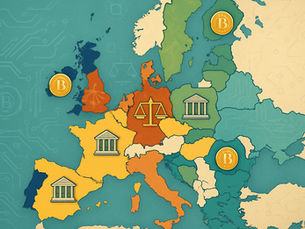Crypto Estate Planning: Securely Protect & Transfer Your Digital Assets
- Tomás Varga, Former Quant Researcher

- Sep 4, 2025
- 6 min read
Updated: Dec 5, 2025
When cryptocurrency holders die, their digital assets can become permanently lost if they haven't set up proper estate plans. Unlike bank accounts or old-school investments, crypto needs private keys or seed phrases for access—there's no customer service to call if something goes wrong. If you don't leave clear documentation and secure access methods, your heirs might never see a dime of your digital fortune.

The decentralized nature of cryptocurrency throws up challenges that regular estate planning just doesn't touch. You have to keep private keys safe, but they can't be so safe that your loved ones can't find them. A lot of crypto owners worry about sharing sensitive info while they're alive (which is understandable), but if they're too cautious, their families can end up with nothing.
Good crypto estate planning means finding the sweet spot between security and accessibility. There are tools and legal setups—like multi-signature wallets or specialized trusts—that can help your digital assets move smoothly to your heirs and hopefully keep taxes and legal headaches to a minimum.
Key Considerations in Crypto Estate Planning
Crypto estate planning means tackling the technical and security quirks of digital assets, putting solid documentation in place for private keys and access info, and making sure whoever handles your estate actually knows what they're doing with crypto.
Unique Challenges of Crypto Holdings
Digital assets come with hurdles that traditional estate planning never had to think about. Private keys are the only way in, and if you lose them, your funds are gone forever.
There's no customer service to restore access to a lost Bitcoin wallet or reset a password. Crypto runs on decentralized networks, so if you mess up, that's usually it.
Hardware wallets and cold storage add even more complexity. You need physical access and a bit of tech savvy to use them right.
Crypto transactions are final. Make a mistake when transferring an inheritance, and that digital wealth could vanish for good.
NFTs and DeFi platforms bring their own headaches—smart contracts, weird platform rules, and sometimes time-sensitive access. Executors who aren't up to speed can easily get tripped up.
Crypto tech changes fast. New platforms and storage methods pop up all the time, so your estate plan needs to be flexible.
Protecting and Documenting Access to Crypto Assets
Solid documentation sits at the heart of any good crypto estate plan. Asset holders should keep clear records of all digital assets—wallet addresses, exchange accounts, storage spots, the works.
Private keys and seed phrases need real security. Think safety deposit boxes, fireproof safes, or maybe even professional custodians if you've got a lot at stake.
Write out instructions for how to get into each type of crypto holding. Every cryptocurrency might use a different wallet or recovery process.
Don't forget to record all the passwords, PINs, and security questions tied to your accounts. Jot down exchange logins and two-factor backup codes, too.
Multi-signature wallets add another layer of security and help with inheritance planning. Since they need more than one person to sign off, they cut down on single points of failure.
Update your documentation regularly. Crypto portfolios shift a lot, and your estate plan should always show what's current.
If you've got a big stash, professional crypto custody services might be worth it. They bring institutional-level security and features made for inheritance.
Selecting and Educating Executors and Trustees
Executors and trustees who handle crypto estates need more than just basic financial know-how. They have to get blockchain tech, how wallets work, and what good security looks like.
Pick fiduciaries who already know crypto or at least have strong technical chops. Sometimes it makes sense to have co-executors—one for your regular assets, another for your digital stuff.
Give them a crash course on your holdings before they need to use it. Even letting them practice with a small amount can make things smoother when the time comes.
Write out step-by-step guides for each kind of asset. Show them exactly how to access wallets, transfer funds, and handle curveballs.
Line up some crypto-savvy pros who can help your fiduciaries if needed—think attorneys, accountants, or technical experts who know their way around digital assets.
Crypto doesn't stand still, so keep your trustees learning as things evolve. If you've got long-term trusts, make sure they stay up to date with the latest best practices.
List emergency contacts and backup steps in case your main fiduciaries can't do the job. Include backup access methods and pro resources for tricky situations.
Legal and Tax Strategies for Including Crypto in Your Estate Plan
Crypto owners have to deal with tricky legal setups and tax rules when building an estate plan. Good documentation, smart trust choices, and knowing how cost basis works can help protect your assets and cut down on taxes for your heirs.
Wills, Trusts, and Legal Documentation
Estate planning attorneys always say: document your cryptocurrency holdings thoroughly. Sure, you can put crypto in a will, but that can backfire.
If crypto goes through a will, it becomes public in probate. That means wallet addresses and other sensitive details could be visible to anyone who checks the court files.
Trusts work better for crypto. A living trust lets you transfer assets while you're alive and still stay in control as the trustee.
Revocable trusts give you flexibility, but not much help on taxes. Irrevocable trusts can cut estate taxes, but you'll have to give up direct control.
Multi-signature wallets fit nicely with trust arrangements. They require more than one person to approve moves, so they help prevent unauthorized transfers but still allow legit ones.
Find an estate planning attorney who knows crypto. Regular trust documents often miss the technical details you need for digital assets.

Your trust paperwork should spell out exactly how trustees handle private keys, seed phrases, and wallet access. Cover all your storage methods, too.
Probate Considerations and Beneficiary Access
Probate can get messy fast for crypto inheritances. The system just wasn't built for digital assets with complicated access rules.
Court officials might struggle to prove who owns what if you haven't left good documentation. Executors often don't have the technical skills to handle crypto wallets safely.
Some crypto exchanges offer Payable on Death (POD) designations, which can skip probate. These setups automatically move the account to your chosen beneficiary when you pass.
But not every type of crypto or storage method supports POD. If you use self-custody wallets or hardware devices, you'll need a different approach.
Beneficiaries need clear, step-by-step instructions to access any inherited crypto. Store these instructions somewhere private—not in your will, since probate makes that public.
Set up emergency access plans in case private keys get lost or hacked. Some estate plans include backup options like professional crypto recovery services.
Time matters in crypto inheritance. With how fast prices swing, delays can really change what your heirs end up receiving.
Tax Treatment and Cost Basis Planning
The IRS sees cryptocurrency as property, not currency, which really changes how you approach inheritance planning. If you want to keep taxes low for your heirs, you need to get a handle on cost basis rules.
When someone inherits crypto, it gets a "stepped-up basis"—basically, its value resets to the fair market price on the day the owner dies. That wipes out capital gains taxes on any growth during the original owner's life.
But if you gift crypto while you're still alive, gift tax rules kick in. The annual gift tax exclusion lets you transfer up to a certain amount to each person tax-free, but anything above that could get taxed.
Gifts made during your lifetime don't get that stepped-up basis. Whoever receives the crypto inherits your original cost basis, so if they sell, they might owe a lot in capital gains tax.
Trusts complicate things further. Grantor trusts usually push tax obligations onto the person who set them up, while non-grantor trusts pay taxes themselves—and those trust tax rates can get steep fast.
Honestly, keeping detailed records is a must for any crypto estate plan. Beneficiaries need to know when the crypto was bought, how much it cost, and every transaction along the way to figure out their cost basis when it's time to sell.
It's easy to get lost in the weeds here. Tax rules for digital assets keep shifting as governments try to catch up, so working with a pro makes sense if you want to stay compliant and avoid surprises.





















































Comments